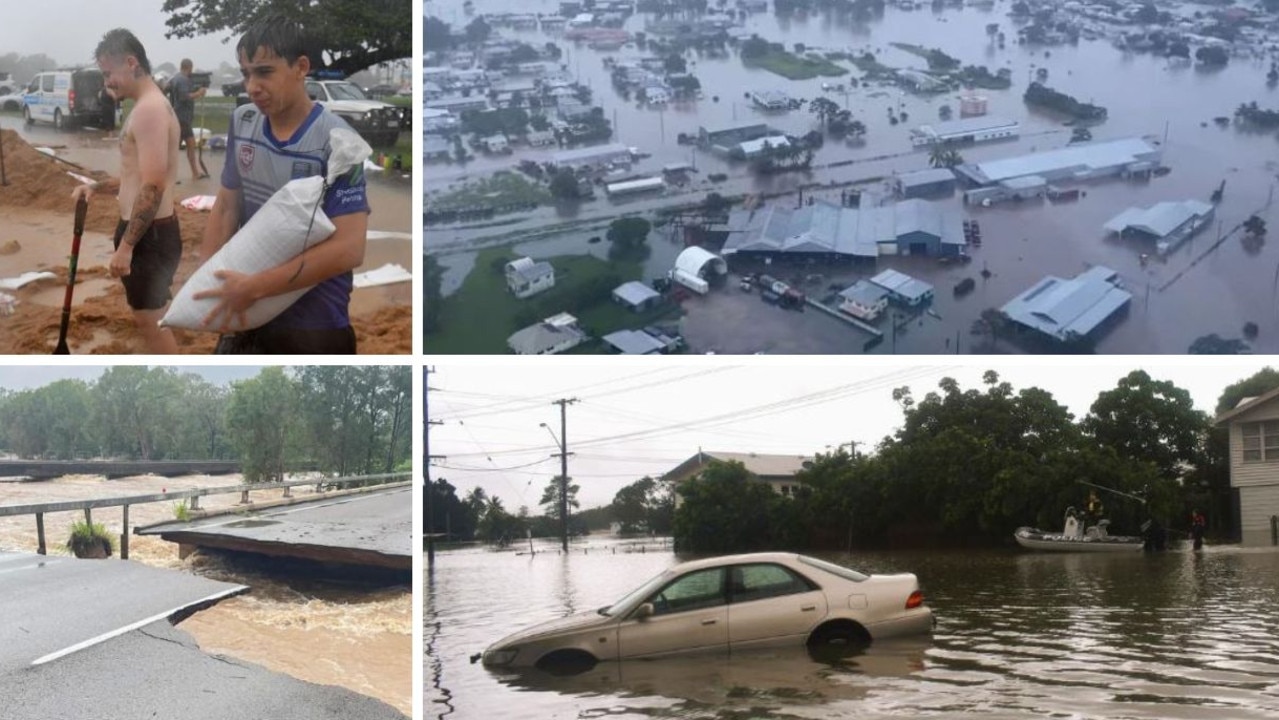No cost-of-living rebates for Qlders as state faces credit rating slump
The treasurer announced no new cost of living relief for Queenslanders as he revealed it was “highly likely” the state would face a credit rating downgrade, increasing interest repayments.
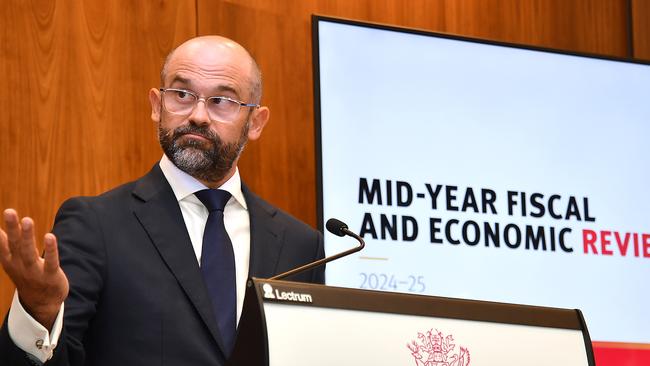
QLD News
Don't miss out on the headlines from QLD News. Followed categories will be added to My News.
Queensland’s public sector wages bill will crash through $40bn within four years and could soar higher as a collapse in coal revenue and “deceitful” spending builds pressure on the government to reverse a debt free fall.
It is also now “highly likely” Queensland will face a credit rating downgrade, increasing interest repayments, Treasurer David Janetzki said.
Mr Janetzki used his mid-year budget update to skewer the former state government for concealing nine years of poor financial management.
“Glossy brochures and endless unfunded promises concealed a problem,” he said.
“It is an extraordinary level of deception that we have calmly and methodically gone through over the last three months.”
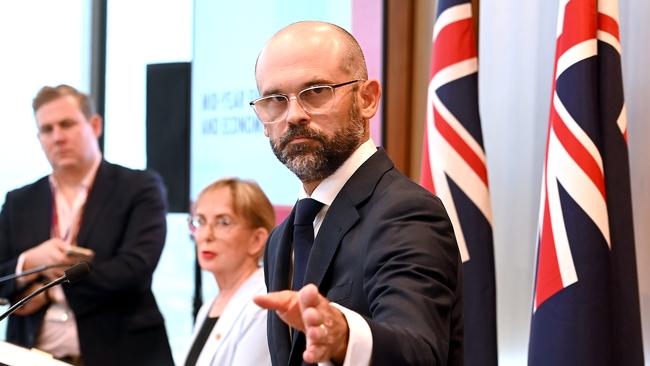
The treasurer announced no new cost of living relief for Queenslanders, however, once measures including energy bill rebates and discounted vehicle registration ends on June 30.
The budget update reveals the government will spend $2.2bn more this year than projected in June – largely due to “addressing funding shortfalls” in frontline services.
Mr Janetzki, who dubbed the mid-year fiscal and economic review “Labor’s last budget update”, now faces significant pressure to deliver the promises made by the LNP during the October state election campaign.
Thursday’s financial update predicts Queensland’s public sector wages bill will hit an eye-watering $42.4bn in 2027-28 – $3.9bn more than Labor forecast in June.
It is based on predictions wages will rise 2 per cent, however unions are now in talks for a 5 per cent increase that could see the bill pass $45bn.
Mr Janetzki said the wage bill increase was because the former state government announced additional public servants without allocating the cash.
“The employee expense increase comes back to the unfunded commitments of the former Labor government … (they) promised more nurses, teachers, police officers, but none of them were funded,” he said.
“It is the most deceitful outcome we could possibly imagine.
“It’s a full exposure of their debt, deficit and deception.”
Mr Janetzki said some $3bn in savings announced by then Treasurer Cameron Dick in June were not delivered.
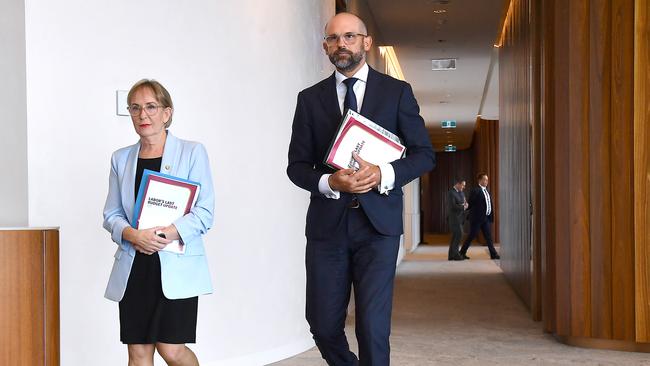
Higher spending and lower revenue will also likely affect the state’s credit rating and make it more expensive to borrow cash.
“Knowing what we know now, with debt per capita tracking to be the worst in the country, it is highly likely that we will not just have an outlook to upgrade, but it’s highly likely we will have a rating downgrade too,” Mr Janetzki said.
The opposition accused the government of “cooking the books” by exaggerating figures to prepare Queenslanders for cuts.
Shadow Treasurer Shannon Fentiman declared the budget figures, including a $217bn debt projection, lacked credibility.
“We’ve had no information from the Treasurer about specific projects and how much the cost will be,” she said.
“The other half … is this $23bn in new expenses for agencies and again, we’ve had very, very vague statements from the Treasurer about where that money is going. It’s not listed as wages.”
Asked whether the lack of credibility meant government departments were inflating costs to Treasury, Ms Fentiman insisted Treasury was doing its job, as directed by the government.
“They are clearly taking an extremely pessimistic view of the cost of these projects,” she said.
Finance Minister Ros Bates rejected Ms Fentiman’s claim the mid-year update had been “juiced up” to appear worse than reality.
“The Labor lemons behind this budget have left a bitter taste in the mouths of all Queenslanders; chaos and crisis,” she said.
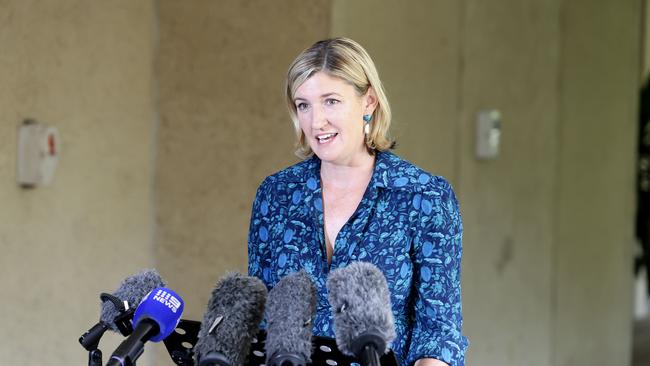
Despite the revelations, Mr Janetzki maintained the government would take a “calm and methodical approach” to the June budget and denied he would cut services or raise taxes.
“We are committed to delivering the services that Queensland needs, and we need more nurses and teachers and police officers and firefighters,” he said.
“They simply weren’t funding the services that were necessary.”
Mr Janetzki revealed he would visit the Borumba Pumped Hydro project, that has increased to $18bn, next week.
Asked about the future of that project and how many smaller pumped hydro facilities the government would build, Mr Janetzki said he would have more to say once the cost increases are considered.
The state’s economic growth will slow 0.5 per cent to 2.5 per cent this financial year.
The unemployment rate is also expected to fall 0.5 per cent next financial year.
Major revenue streams royalties and GST are forecast to dramatically decline by $2.7bn (5 per cent), including a $421.4m fall in coal royalties.
Mr Janetzki maintains he can save $6.9bn in expenditure on consultants and contractors, which will be put towards its $4bn worth of election commitments.
He acknowledged it would be a “serious challenge” to return the budget to an operating surplus but has again ruled out cuts to services, asset sales, royalty and tax hikes.
It was revealed debt would hit an eye-watering $217bn by 2028 – the equivalent of $39,082 for every person – as explosive government spending puts Queensland deeper in the red than any other state or territory.
Per capita debt is tipped to hit $39,082 within four years and become the nation’s highest – worse than economically troubled Victoria.
Originally published as No cost-of-living rebates for Qlders as state faces credit rating slump


